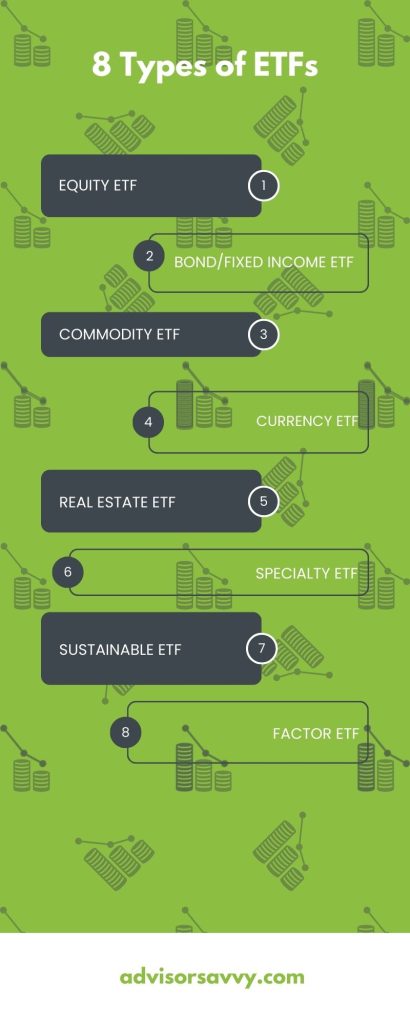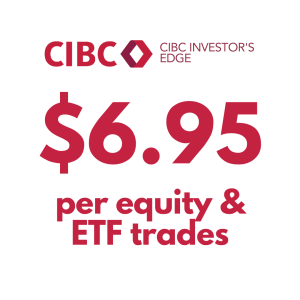
Exchange-traded funds (ETFs) are great entry points into the vast and volatile stock market. Especially because they allow you to spread out your risk and, at the same time, offer low expenses. However, there are many different types of ETFs. In fact, ETFs have become a popular investment idea in Canada which is why there are so many to choose from. This is where confusion sets in for newbies in the world of investing. Choosing an ETF becomes an overwhelming task with such a variety at your disposal.

Table of contents
One thing to note is that each type of ETF exists to meet a specific investment need. This allows investors to choose the best investment vehicle to reach their goals effectively. Here, we’ll examine the different types of ETFs. Whether you’re new to investing or a seasoned investor, you’ll learn which ETF best suits your investment goals.
CIBC Investor’s Line Offer
Up to $6.95 per online stock or ETF trade. Plus, there’s no minimum account balance.
What is an ETF?
An exchange-traded fund, better known as an ETF, is a type of investment fund that allows a group of investors to buy several stocks, bonds, and other assets. The company pools investors’ money, invests them into these assets, and pays the investors interest in return. In other words, when you invest in an ETF, you do not purchase an individual stock or one type of asset, but rather a basket of securities. This becomes advantageous to investors since this strategy can potentially lower risk and exposure, while offering a balanced portfolio.
ETFs trade on the stock exchanges, hence the name. They can be bought and sold at varying prices and at different times throughout the day, similar to company stocks. ETFs often track the performance of a specific index by holding the same securities as the index. For example, the Vanguard S&P 500 ETF tracks the performance of the S&P 500 Index.
Related Reading: BMO ETFs vs Vanguard ETFs

What are the main types of ETFs?
As mentioned, there are many types of ETFs available to the Canadian investor. It can be a challenge to determine which one is the best addition to your portfolio. Below is the list of the different types of ETFs with helpful details to assist your next investment decision.
Equity ETFs
Equity exchange-traded funds are the most common type of ETF. They’re simply funds that track an index of equities. Equity ETFs invest in a variety of company stocks, also known as equities. Investing in an equity ETF allows you to own shares of hundreds or thousands of companies, which entitles you to the profits of these companies as well. An equity ETF is further classified as follows:
- Market-Based: Equity ETF based on market capitalization. They are further divided into small-cap, mid-cap, and large-cap.
- Sector-Based: Sector ETFs invest in different companies within a specific sector, such as healthcare ETFs, tech ETFs, Ethereum ETFs, and so on. These allow investors to diversify their investments within a particular sector.
- Factor-Based: This equity ETF tracks indexes using various factors, including size, volatility, and momentum.
CIBC Investor’s Line Offer
Up to $6.95 per online stock or ETF trade. Plus, there’s no minimum account balance.
Bond and Fixed Income ETFs
Bond ETFs are among the most popular types of ETFs. A bond ETF is a type of exchange-traded fund (ETF) that primarily invests in bonds. Bonds are loans issued by the government or corporations as a way of raising funds without offering up their shares for sale. When you buy a bond, you’re giving the issuer a loan. The issuer repays the loan with interest on an agreed date, typically at end of the bond’s life. Bond ETFs focus on government, municipal, international, or corporate debt. These financial instruments are traded on the exchanges, similar to stocks.
Why invest in bond ETFs? Bond ETFs are highly liquid investments. This means you can easily sell your investment anytime you wish. A bond ETF is not subject to maturity date unlike individual bonds purchased directly. Popular bond ETFs include Vanguard Total Bond Market ETF (BND), iShares Core US Aggregate Bond ETF (AGG), and iShares Core Total USD Bond Market ETF (IUSB).
Commodity ETFs
A commodity ETF tracks the prices of specific commodities including silver, gold, platinum, and agricultural products. However, investing in these funds does not give you ownership of these assets.
For instance, if you buy a gold ETF, you do not get a chunk of physical gold to store and wait for the price to go up. Rather, you’re buying a gold derivative contract that tracks the price of gold. When you sell your investment, you receive the cash equivalent.
The value of the commodity depends on the laws of supply and demand. Commodity ETFs are passively managed in most cases. Popular examples of commodity ETFs include iShares Silver Trust (SLV) and Horizons Gold Yield ETF (HGY).
Currency ETFs
Currency ETFs track the performance of either a single currency, such as the CAD dollar, in the foreign exchange market, cryptocurrency, or a basket of currencies.
Generally, investing in a currency ETF offers investors exposure to the forex market. Investors can invest in currencies that are likely to increase in value. Investing in a currency ETF can also serve as a strategy to hedge investment risk in the forex market.
However, you should keep in mind investment in currencies involves high risks since currencies are highly volatile. The value of a currency depends on various factors, including economic conditions, political situations, and interest rates.
Related Reading: 5 Best Money Market ETFs in Canada

Match to your perfect advisor now.
Getting started is easy, fast and free.
Real Estate ETFs
Real estate exchange traded funds are a type of ETF that invests in the real estate market. Majorly, they invest in real estate investment trusts (REITs). REITs refer to companies that own and manage real estate, such as apartments, hotels, office complexes, and warehouses. REIT ETFs invest in shares of REITs.
By investing in a real estate ETF, investors can easily get into the sector instead of buying traditional real estate. As well, many REITs have a track record of paying dividends. Real estate ETFs are expected to pay out as much as 90% of their taxable income to shareholders. This makes the fund highly attractive in terms of yield, regardless of the increased volatility.
Factor ETFs
Factor ETFs are exchange-traded funds that look out for and invest following certain market indexes. These ETFs target companies that exhibit certain factors which include growth, value, volatility, and momentum.
This type of ETF primarily seeks to help investors increase returns, improve investment performance and mitigate risk. And so, using these indexes or return drivers, they ensure that investors stand a better chance of making a profit. Factors ETFs have grown in popularity in recent years among many institutional investors and active managers.
Specialty ETFs
Funds created to meet specific investment needs and strategies fall under this category. Two of the most popular specialty ETFs include leveraged funds and inverse funds.
Leveraged funds use borrowed money to double or triple the returns of an underlying index. Inverse funds profit when the target index performs poorly. This strategy is similar to short-selling a stock as the investor gains when the underlying index goes down.
Before investing in specialty ETFs, however, keep in mind that they can be high-risk investments. These ETFs can lead to significant gains but can also lead to significant losses. They aren’t great options for long-term investing or beginner investors.
Sustainable ETFs
Sustainable ETFs are exchange-traded funds that combine traditional investing with social, environmental, and governance insights. They invest in companies that have shown commitment to reducing global carbon footprint and promoting diversity and inclusion. These ETFs go beyond profitable investing goals to supporting the quest for a sustainable, interconnected world.
The demand for sustainable ETFs arose following the trends in demographic shifts, government policies, and unfolding opinions on risk. Over the years, this type of investing has become popular across a wide range of investors.
What type of ETF should I buy?
Different ETFs exist to meet varying investment needs. As such, the type of ETF you should buy depends on your investment goals. For example, if you’re working with a long-term investment horizon, specialty ETFs aren’t the best choice. They carry a significant amount of risk and are better for a short-term investment horizon. But if you’re looking for little but stable income, real estate ETFs are more appropriate. They’re also extremely attractive in terms of yield if you’re looking for a passive income stream. Another key factor to consider when investing in exchange-traded funds is your risk tolerance. If you have a low tolerance for risks, you should avoid high-risk investments.
As a general rule, ensure to study any type of ETF you wish to invest in. Learn about how it works, the profitability, the risks, and the requirements. The more information you have going into an ETF investment, the better the outcome will be!
Read More: Top 10 Mutual Fund Companies in Canada

